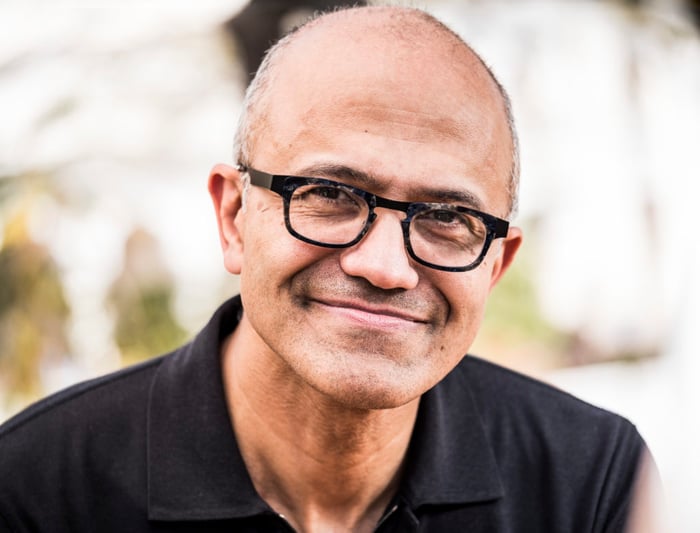Microsoft (MSFT -0.00%) just became the latest tech giant to thin its workforce.
After news broke Tuesday night about layoffs, the software titan confirmed the news Wednesday morning. In a memo to employees shared publicly, CEO Satya Nadella said the company was eliminating 10,000 jobs, less than 5% of its workforce.
Much like Meta Platforms, Amazon, and Salesforce, which have all announced layoffs in recent weeks, Nadella noted the whipsaw effect in the economy, saying that demand for technology accelerated during the pandemic, but has since slowed as much of the world is either in a recession or anticipating one.
Microsoft stock seemed unaffected by the news in Wednesday morning trading, a sign investors didn't expect it to have a big impact on the business' performance. The company also seems to be coming at the job cuts from more of a position of strength than its peers above. However, with its biggest round of job cuts since 2015, and coming at a time when the tech industry appears to be headed for a recession, the move deserves investor attention.

Microsoft CEO Satya Nadella. Image source: Microsoft.
Where the cost cuts are coming from
Nadella said it's crucial for the company to evolve with platform shifts -- a lesson Microsoft learned the hard way when it missed out on mobile -- and it is "aligning its cost structure with our revenue and where we see customer demand."
In particular, the company said it was making changes to its hardware portfolio, implying that some of the job cuts could target its consumer hardware divisions, including products like Surface tablets and Xbox gaming consoles. Demand for PCs has declined in recent quarters, and Windows OEM revenue fell 15% in the fiscal first quarter, a sharp slowdown after a boom during the pandemic.
The company didn't single out any other business segments in the memo but did say it aimed to consolidate its real estate footprint, echoing similar statements from Meta and Salesforce, as it looks to save costs on real estate as well.
Microsoft expects to take a $1.2 billion charge in its second-quarter earnings report, which is due out next week, for severance, hardware changes, and lease reductions.
Microsoft is still playing offense
In the letter, Nadella left no doubt that the company is still focused on growth, just in the areas that make the most strategic sense. He said the company is continuing to hire in key areas, and allocating "our capital and talent to areas of secular growth and long-term competitiveness for the company." As such, the layoff announcement seems to be as much about realigning the company with its strategic goals as it is about cutting costs.
The CEO also seems to be doubling down on artificial intelligence (AI), saying, "The next major wave of computing is being born with advances in AI, as we're turning the world's most advanced models into a new computing platform." The company has already begun integrating OpenAI technology into Azure, its cloud infrastructure business, announcing on Monday that an expansion of its Azure OpenAI service (which includes access to ChatGPT) is now generally available.
Microsoft formed a strategic partnership with OpenAI in 2019, investing $1 billion in the start-up at the time, and media reports have said recently that it is in talks to invest as much as $10 billion in the AI expert. Microsoft also reportedly plans to launch a ChatGPT-powered version of its Bing search engine as early as March.
What the layoffs mean for investors
Coming less than a week ahead of its fiscal second-quarter earnings report, the layoffs could signal that the quarterly numbers will be weaker than expected. The company had already noted macro headwinds building in the cloud computing division, and the layoffs across the tech sector and comments from other CEOs indicate those headwinds seem to have strengthened in the fourth quarter.
While companies would prefer to avoid layoffs since they mean real people are losing their jobs, it makes sense for Microsoft to realign its priorities with the opportunities in front of it, especially in a recessionary environment.
It's also worth remembering that Nadella's record as CEO is nearly impeccable. Since he took over Microsoft in 2014, the stock has outperformed the S&P 500 every year except for 2022, and he has made smart moves, including building Azure into a powerhouse, ending the war against Apple by allowing compatibility with Office and other Microsoft apps, and avoiding the blunders and busted acquisitions that had become common under former CEO Steve Ballmer.
Nadella's bet on AI and the company's partnership with OpenAI could also reap huge rewards for investors.
While the layoffs could signal a setback for the company, it's worth trusting Nadella's stewardship here. And maintaining efficiency and adapting to change are crucial for any tech company. Though a potential recession could weigh on the stock this year, expect Microsoft to continue to outperform over the long term.





